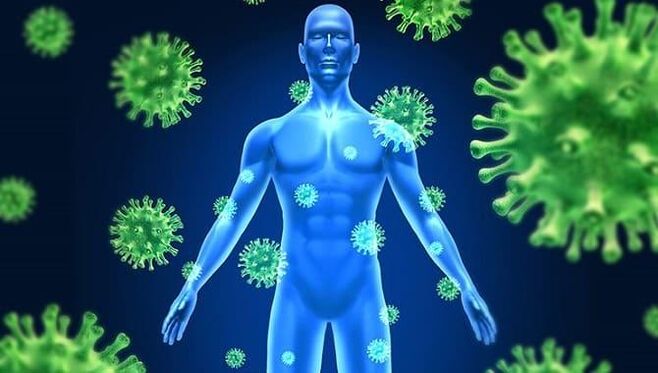Parasitic disease is a group of diseases caused by microorganisms, arthropods and only worms. They differ in a slow process and affect critical systems. Gastrointestinal disturbances, changes in body weight, chronic fatigue are the main signs that the presence of parasites in the human body. To diagnose invasive diseases, ultrasound of the peritoneum organs, analysis of biological disorders and biochemical blood tests are performed.
What parasites can live in a person
The pathogens of parasitic diseases are worms, arthropods and protozoa - viruses, fungi, protozoa. In 69% of cases, helminthic invasions are diagnosed, caused by such types of worms:
- trematodes (trematodes) - trematodes, major liver fluke and liver fluke;
- a curette (acanthocephalosis) - a granular scorpion, a giant comb;
- roundworm (roundworm) - hookworm, pinworm, roundworm, whipworm;
- cestodes - broad tapeworms, bull tapeworms, tapeworms.
Endoparasites predominate among helminthic invasions, which settle in the small or large intestine. Common parasitic arthropods include:
- cicadas;
- centipede;
- reed;
- insect.
The temporary parasitic group includes arthropods and leeches, and the permanent parasitic group includes lice, parasitic worms and itch mites. Common invasive pathologies are due to opportunistic fungi, protozoa - amoeba, lamblia.

The parasite negatively affects the body, causing undesirable systemic effects - intoxication with waste products, digestive dysfunction, allergies, anemia.
General signs of the presence of helminths
Symptoms depend on the type, location and number of the parasites in the body. The basis of the clinical picture is the immune response to parasitic infection and damage to individual organs.
Digestive problems
Gastrointestinal disturbances are mainly caused by parasitic worms, located in the small intestine. Their waste products cause an allergic reaction in the body, narrowing the bile ducts. Hence, there are complaints about:
- undigested;
- distention;
- heartburn;
- picky eaters.
More than 80% of patients suffer from constipation, diarrhea and flatulence.
Stomachache
Abdominal pain and a feeling of heaviness in the abdomen are obvious signs of a parasite in the body. They stimulate the receptors of the lining of the gastrointestinal tract, causing contraction of smooth muscles. As a result, abdominal pain occurs.
If the helminths act as triggers for an invasive disease, then abdominal discomfort occurs as they penetrate the intestinal wall.
Anal itching
Periodic itching of the anal area and painful bowel movements are the first signs of a parasite in the body. Symptoms are mainly caused by pinworms, less often than by roundworms. Previously laid eggs in the anus, causing intense itching.
The lifespan of pinworms is only 1, 5 months. Tapeworm eggs have a protective shell, so they are not destroyed by external factors.

Failure to comply with hygiene leads to self-infection, an increase in the number of worms in the body.
Change in body weight
An increase or decrease in body weight is a clear sign that a parasite is present in the body. The weight fluctuations are the result of:
- increased or decreased appetite caused by drunkenness;
- metabolic disorder;
- intestinal dysbiosis.
In half of the cases, patients complained of a constant feeling of hunger. But if the parasite is localized in the small intestine, more than 70% of nutrients do not enter the bloodstream.
Blood in the stool
Signs of parasitic infection depend on the invading pathogen. Presence of blood and mucus in the stool indicates intestinal damage:
- human roundworm;
- wide band;
- pinworm.
When entering the body, the parasite causes intestinal irritation. Inflammation of the walls leads to hemorrhage and mixed blood with feces.
Skin change
An allergic reaction is the most obvious sign of a parasite in the human body. According to statistics, large invasions cause toxic allergic changes in 92% of patients:
- itchy skin;
- abscesses;
- red spots;
- yellowing;
- peel off;
- dry skin.
Yellow skin indicates that bile in the body is stagnant, increasing the activity of liver enzymes.
Decreased immunity
Helminthiasis in adults is accompanied by dysbacteriosis. More than 75% of immune tissue is in the digestive tract, so parasitic diseases lead to secondary immunodeficiency. The decrease in the body's resistance to infections is manifested by:
- frequent colds;
- Long-term healing of cuts and scratches;
- Frequent exacerbations of chronic diseases.

The parasite depletes the body's protective reserves, reducing the production of antibodies against viruses, fungi and bacteria.
Allergy
Worms poison the body with the products of their vital activity. Toxicity leads to autoimmune disorders, which are manifested by allergic effects:
- itchy skin;
- bronchospasm;
- rash on the body.
The most pronounced toxic allergic reactions result in roundworm, trichinella and echinococcus.
Joint and muscle pain
Muscle pain and joint pain - muscle and joint pain - are signs of the presence of the parasite in the human body. In the migratory stage, helminth larvae follow the bloodstream. Many of them are deposited in joint fluid and muscle, causing pain sensation.
Heart palpitations
The parasite's toxin negatively affects the cardiovascular system. The massive infiltration of helminths causes:
- tachycardia (tachycardia);
- hypertension.
Dangerous complications are caused by representatives of the tapeworm - echinococcus. They form echinococcal cysts not only in the heart but also in the lungs.
Hair loss
Impaired absorption of substances from the gut leads to a lack of many vitamins and metabolic disorders. Therefore, the frequent companion of parasitic diseases are:
- dull hair;
- excess oil scalp;
- hair loss (hair loss).

Deficiencies in vitamins and minerals lead to a recurrent sebum secretion, which in many cases leads to irreversible hair loss.
Change taste preferences
Violation of taste perception (dysfunction) when the body is affected by the parasite is caused by a change in the protein composition of the blood, anemia.
What are the signs of indigestion:
- an unpleasant taste in the mouth;
- craving for sweets;
- dullness of taste;
- burning sensation in the mouth.
Taste disturbances are often linked to gastrointestinal diseases caused by parasitic worms.
Chronic fatigue syndrome
Metabolic disorders, deficiencies in vitamins and other useful components lead to a decrease in the body's energy stores, disorders in the liver. As a result, patients with invasive disease complain about:
- tired quickly;
- continuous sleepiness;
- wander;
- comatose.

The feeling of fatigue does not go away even with rest or long sleep.
Avitaminosis
Avitaminosis is a lack of vitamins in the body. It occurs when the parasite is localized in the small intestine. Symptoms depend on which vitamin is missing. More often, patients complain of:
- dizziness;
- vision loss;
- frequent nausea;
- headache;
- worsening of the skin.
Long-term vitamin deficiency is dangerous due to dysfunction of vital organs.
Anemia
Anemia or anemia - a decrease in the concentration of hemoglobin in blood cells. When the body is damaged by parasites, a deficiency of vitamins involved in the synthesis of hemoglobin and red blood cells occurs:
- folic acid;
- cyanocobalamin;
- vitamin C.

Anemia when infected with helminthiasis manifested by difficulty breathing, headache, loss of appetite, tinnitus.
Anxiety, sleep disturbances
Human parasitic infection is manifested by intoxication, which negatively affects the functioning of the nervous system. Then there were complaints about:
- a drastic change in mood;
- Anger;
- depression;
- sleep disorders.
Emotional insensitivity to the background of anemia and anemia is a clear indication that the body is harmed by parasitic worms.
Loss of memory and attention
Cognitive impairment - decreased mental ability, memory and attention - arise in the context of chronic poisoning of the body with the products of the parasite's vital activity. Helminthiases disrupt the functioning of many organs, causing the nervous system and brain tissue to be affected. But in 94% of cases, the cognitive disorder is reversible.
A cough
A dry cough without symptoms of ENT is one of the signs of a parasitic infection. 8/10 cases of cough of unknown cause are caused by:
- human roundworm;
- pulmonary fluke.
During the migration phase, the larvae of the worms enter the lungs. When coughing, roundworms enter the oral cavity, then they are swallowed and deposited in the intestines.
Other signs
Additional symptoms of invasive disease include:
- increased body temperature;
- enlargement of the liver;
- halitosis;
- obstructive jaundice;
- yellow coating on the tongue;
- bronchospasm;
- isolation of worms fragments with feces;
- sleep is not peaceful;
- chest;
- increase gas generation;
- vaginitis in women;
- right-sided migraine.

With brain damage, neurological disorders, psychosis is possible.
Symptoms of infection with other parasites
The clinical picture depends on the pathogen of the parasitic disease.
| Disease form | The symptoms |
| giardiasis | nausea, belching, itching, flatulence, fever |
| toenail disease | scalp itching, burning in the bites of lice, red spots and nodules on the head, insomnia, nits in the hair |
| mycosis | peeling skin, nail damage, sour smell, thickened epidermis, cracks |
| Amoeba disease | stomach pain, vomiting, bloody stools, loss of appetite. |
There are many signs of invasive bodily harm. To rule out complications, a blood test for parasites should be done at least once a year.
Why are untreated parasitic infections dangerous?
Parasitic infection has a systemic effect on the body, disrupting the function of all organs. Delayed treatment leads to:
- bowel obstruction;
- pancreatitis;
- rectal prolapse;
- lymphadenitis;
- Myocarditis;
- bronchopneumonia;
- cholecystitis;
- endometritis;
- pleurisy;
- stomach ulcers;
- meningitis;
- heart failure;
- purulent peritonitis.
In the presence of chronic diseases, the parasites complicate their process. Ignore invasive diseases dangerous to disability, even death.
Diagnosis and treatment
Laboratory tests used to identify the parasite:
- shaving for filariasis;
- coprogram program;
- fecal analysis for egg leaves;
- enzyme immunoassay for antibodies to the parasite.
In the case of intestinal invasions, instrumental examination should be performed - ultrasound of the peritoneal organs, colonoscopy and liver scans.
The effectiveness of anthelmintic therapy is determined on the basis of repeated diagnosis, which is carried out 1 month after treatment.
Depending on the results of the diagnosis, antiparasitic drugs are prescribed:
- anti-nematode;
- anti-fluke;
- protivocestodozny;
- broad spectrum helminth bleach;
- anti-fungal;
- fighting lice;
- remedy for scabies mites.
Parasitic cysts (such as echinococcal cysts) are removed surgically.
Clinical manifestations and treatments for parasitic diseases depend on the type of pathogen. The parasite enters the body through natural openings - mouth, skin pores, urethra, etc. v. Timely diagnosis and treatment of invasive diseases prevent complications - meningitis, peptic ulcer, myocarditis.






































